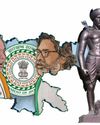The BCCI detests the RTI’s bind. Yet its very structure—the men who officiate in matches—stands on government patronage.

FOR several years, the central government has been making an effort to bring the Board of Control for Cricket in India (BCCI) under the Right to Information (RTI) Act, like all National Sports Federations (NSFs). But the Board has been steadfastly, even auda ciously, stonewalling the government, thanks to the full backing of politicians who have been—and still are—part of it. Successive dispensations, too, have never really been serious about implementing it.
While defying government RTI orders with disdain, the main thrust of BCCI’s defiance—and on which it has been harping unashamedly—has been that it doesn’t take financial assistance from the government. That is only partly true, as it does take indirect, ‘substantial assistance’, as the Delhi High Court observed some years ago and something the Union sports ministry, too, keeps insisting. And, crucially, the men who are the foundational support to the superstructure of BCCI-run tournaments—match officials who run things on the ground—are employees of government institutions. It’s a matter on which the BCCI conveniently, and consistently, keeps mum.
This April, The Law Commission of India (LCI) in a report prepared on directions of the Supreme Court, recommended that the RTI Act be made applicable to the BCCI and all its state affiliates. In addition, the Supreme Court has concluded, in the famous ‘BCCI versus Netaji Cricket Club (Chennai)’ case of 2005—and even in the Zee Telefilms vs Union of India case—that the Board “exercises enormous public functions” and “state-like functions”. These include selection of national teams that are fielded in global tournaments, with players/officials wearing the Indian national logo using the word ‘India’, which is part of the Emblem Act.
هذه القصة مأخوذة من طبعة August 13, 2018 من Outlook.
ابدأ النسخة التجريبية المجانية من Magzter GOLD لمدة 7 أيام للوصول إلى آلاف القصص المتميزة المنسقة وأكثر من 9,000 مجلة وصحيفة.
بالفعل مشترك ? تسجيل الدخول
هذه القصة مأخوذة من طبعة August 13, 2018 من Outlook.
ابدأ النسخة التجريبية المجانية من Magzter GOLD لمدة 7 أيام للوصول إلى آلاف القصص المتميزة المنسقة وأكثر من 9,000 مجلة وصحيفة.
بالفعل مشترك? تسجيل الدخول

Trump's White House 'Waapsi'
Donald Trump's victory in the US presidential election may very well mean an end to democracy in the near future

IMT Ghaziabad hosted its Annual Convocation Ceremony for the Class of 2024
Shri Suresh Narayanan, Chairman Managing Director of Nestlé India Limited, congratulated and motivated graduates at IMT Ghaziabad's Convocation 2024

Identity and 'Infiltrators'
The Jharkhand Assembly election has emerged as a high-stakes political contest, with the battle for power intensifying between key players in the state.

Beyond Deadlines
Bibek Debroy could engage with even those who were not aligned with his politics or economics

Portraying Absence
Exhibits at a group art show in Kolkata examine existence in the absence

Of Rivers, Jungles and Mountains
In Adivasi poetry, everything breathes, everything is alive and nothing is inferior to humans

Hemant Versus Himanta
Himanta Biswa Sarma brings his hate bandwagon to Jharkhand to rattle Hemant Soren’s tribal identity politics

A Smouldering Wasteland
As Jharkhand goes to the polls, people living in and around Jharia coalfield have just one request for the administration—a life free from smoke, fear and danger for their children

Search for a Narrative
By demanding a separate Sarna Code for the tribals, Hemant Soren has offered the larger issue of tribal identity before the voters

The Historic Bonhomie
While the BJP Is trying to invoke the trope of Bangladeshi infiltrators”, the ground reality paints a different picture pertaining to the historical significance of Muslim-Adivasi camaraderie